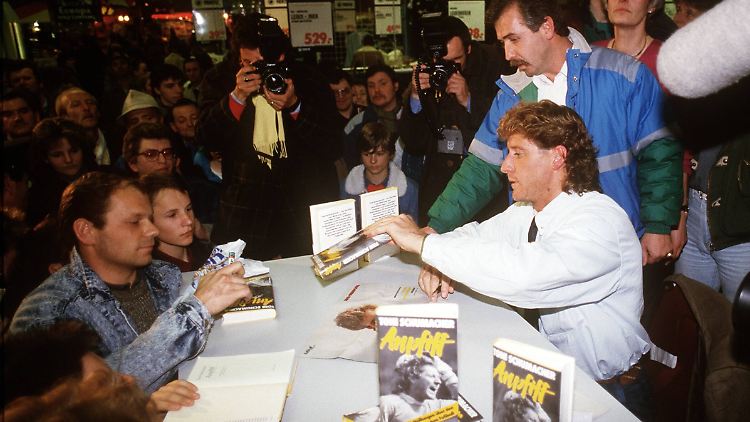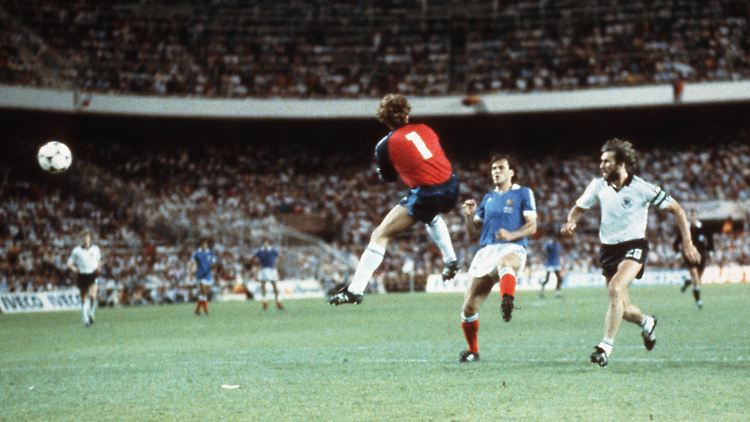The life of German goalkeeping legend Harald “Toni” Schumacher is worthy of a film. But first, the former national goalkeeper will now appear in a play for his 70th birthday. It’s about the “Night of Seville” – and the foul on Battiston. But the bigger scandal in his career was probably something else!
“I would write the book again in a heartbeat. I’d rather be a lion for a year than a sheep for ten years. How should I know that truth is forbidden in Germany?” It was the crux of Toni Schumacher’s incredible career, but it was far from the end of his career. But the publication of his book “Anpfiff” at the beginning of March 1987 changed everything in the national goalkeeper’s life. “I didn’t want what happened back then,” Schumacher once said, but he didn’t want to undo this event of national importance either. Even if he never really understood what exactly happened to him back then. But Harald, who they called Toni after his middle name Anton since he started at 1. FC Köln, had a guess: “The people love betrayal, but they hate the traitor.”
For the two-time vice world champion, the topic of “truth” was and has always been the crucial point when looking at the “emotional descent” and subsequent “crash landing”. According to Schumacher, his mother told him to “always be honest” and now he was “punished” for telling the truth: “I didn’t want to sugarcoat it, I wanted to paint the picture the way I saw it. Fat Oil paints instead of watercolors.” And this picture was actually painted with brutal openness and honesty. But that shouldn’t have really surprised anyone.
In October 1983, Schumacher had already given an interview to the ” Fußball-Magazin “, which the monthly magazine announced in bold letters on the cover as follows: “Our national goalkeeper is clearing the air. Toni Schumacher: ‘Now I’m unpacking!’ An open-hearted interview from Cologne about dissatisfaction and misunderstandings.” According to the magazine, at the beginning of the conversation the keeper was wearing sunglasses, but at the end he was wearing an open visor. Typical for Schumacher – and that would take revenge in March 1987. From then on, many things, if not everything, went differently in the national goalkeeper’s life.
Weisweiler was unnerved early on
But Toni Schumacher’s career had already experienced some miraculous turning points. His sporting fate was actually sealed in the mid-1970s. For five long seasons, people in Cologne looked at his fluctuating performances in perplexity and quietly hoped that the big breakthrough would come at some point. But nothing happened. Finally the day came when his coach Hennes Weisweiler gave up in exasperation and finally decided: “I’m giving Schumacher away now. I don’t want to see him anymore!”
Schumacher collapsed. His dream of a great goalkeeper career seemed to be over before it had even really begun: “I lay in bed and kept saying to myself: My God, no one will take you anymore.” Inwardly agitated, he remembered the time when his parents lovingly encouraged him during the first goalkeeping sessions with pillows and a sofa in the living room at home: “Darling, do the Herkenrath.” He had become German champion and cup winner in the 1950s and, according to his parents’ wishes, little “darling” Harald was supposed to achieve these triumphs one day.
One lunch changed everything
The goalkeeper of the 1980s, hungry for success and bursting with energy and self-confidence, did not yet exist back then. Schumacher had treated his talent almost negligently over the years. But fate was kind to the Cologne “Tünn”. Since shortly before the end of the season in Berlin, the goalkeeper Norbert Nigbur, who had been chosen for the new season, pinched his meniscus at lunch (!) and Schumacher suddenly made a big impression, Weisweiler surprisingly thought better of it and patted the Cologne goalkeeper appreciatively on the shoulder: “Young ‘, you stay, you’re my man now!”
When Schumacher remembers this time, he still realizes: “Until then I was a sausage!” From now on, the Cologne keeper worked like a wild man. His motto was: “Pain is imagination!” As proof, he once had his wife put out a lit cigarette on his forearm. Of course, without contorting your face in pain.
Schumacher trained like a man possessed. Down in the basement there was a punching bag hanging from the ceiling, which he punched until his hands were bloody. If he made a mistake – like in the 1986 World Cup final in Mexico – he stuck his own portrait to the sandbag and beat himself relentlessly. Because the great Toni Schumacher was always aware of one thing: “At some point I’ll give up the spoon and I’ve only been able to do one thing: catch balls!”
“It could have caught me too”
Of course that’s not true. Toni Schumacher is and was a real guy – on and off the pitch. So it’s not surprising that at the end of the 1980s, media manager Hans Rudolf Beierlein knew exactly how to turn football into an event and who was best suited to be the driving force behind it: “Any sport can fascinate people if it succeeds , to build up stars. Just look at Toni Schumacher! He’s a figure who really screams for entertainment. He’s not just a quick-witted boy. He also has a sense of humor – and he’s a woman’s type. Someone just has to get to him and make something out of it; according to the motto: Football is entertainment.”
By the way, Toni himself corrected the issue with the “type of woman” a little with Karl Dall in his Sat.1 show “Jux und Dallerei” in 1993: “I only noticed girls when I was already 18 years old. Before that, I always stopped just balls for the only round things!” And quite soon after that he was already married, although he didn’t seem to have given up the chase completely: “I married a woman with short blonde hair, although my type was always the woman with long dark hair. It depends “I would never despise a Bo Derek, for example…” The man simply cannot and could not get out of his skin – even when asked such intimate and private questions about his type of woman, he answered completely without blinders.
It was precisely this frankness that he was criticized for long after the other unforgettable event of his career – the semi-final of the 1982 World Cup in Spain. Back after that July 8th, France’s team doctor said that he thought his player Patrick Battiston was dead: “I didn’t feel a pulse for two minutes!”. The Frenchman was lying unconscious and motionless on the floor. Shortly before, Schumacher had fallen out of his goal and ran over Battiston a few meters from the penalty area line. Without slowing down and without considering losses. A collision that makes you want to look away as soon as you watch. The next day, Schumacher said with a little distance, still very cool and distant: “This is the tough professional business with all the risks. It could have caught me too.”
When the keeper thought of Guy Béart
It was precisely this apparent cold-bloodedness that shocked and stunned many observers the evening before at the semi-final game between Germany and France at the 1982 World Cup in Spain. Another quote from the German keeper from that evening has now become a legend: “Then I’ll just pay him his jacket crowns.” Later, Schumacher once said that he wanted to express how relieved he was that nothing more had happened and that was why this casual saying came to his lips.
But back to 1987. Author Michel Meyer, with whom Schumacher wrote the book at the time, was resigned to the lying reactions from the press, the public and the football community: “I am astonished by the hypocritical attitude of the DFB. I have been thinking since a few days ago a chanson by Guy Béart, where the refrain begins: ‘He has the truth, so we have to execute him.'” An important sentence if you want to understand the reactions and the level of indignation and Schumacher’s subsequent thoughts about this restless time.
In addition to the doping issue, it was mainly the many small tips against professional colleagues that caused a stir. For example, the Cologne native wrote about his Schalke national team colleague Olaf Thon: “Many young players are lazy sacks. And a few are also criminally stupid. Olaf Thon is a prime example.” Even in his hometown of Düren, Schumacher was no longer welcome after the publication. Because in his book he had described former neighbors as “anti-socials”, fathers as “alcoholics” and mothers as “a mixture of sluts and pincers”, the sports committee disinvited him from a celebration.
Schumacher wouldn’t do anything differently
The rest is history. The reactions too. Bayern goalkeeper Jean-Marie Pfaff stated bluntly: “I hate to say it, but for me Schumacher is a traitor. Great players have to be role models. Toni should look in the mirror and spit to himself.” And Sepp Maier added: “It can only be the case that after the World Cup in Mexico, in which he undisputedly did well, Schumacher thought that he was all-powerful and that no one could harm him. I have written six books, but one like this I wouldn’t write a book today. Something like that isn’t appropriate.” But for Schumacher, even more than thirty years later, it is still important to emphasize: “I didn’t get a single injunction, not a defamation lawsuit. Because everything I wrote in my book was true.”
To this day, the Schumacher book and the scandal surrounding his work are one of the great legends of German football. Never before or since has a book by a German footballer caused so much attention and excitement. And to this day, Harald “Toni” Schumacher cannot understand what happened to him back then: “It wasn’t the grievances that were eliminated, but the person who openly addressed them.”
Today the man who wrote at least as many stories in his career as he won titles – European champion, German champion, multiple DFB Cup winner, Turkish champion – is celebrating his 70th birthday and is returning to the big stage in time. In the play “The Night of Seville – Football Drama in Five Acts”, Schumacher plays himself. The former German national goalkeeper is now at peace with his career and the events of that time. And so he can say with a clear conscience: “Football is also a certain kind of theater. But I’m glad that I can now take part in real theater.” Have fun, dear Harald “Toni” Schumacher, congratulations on your birthday and good luck!


